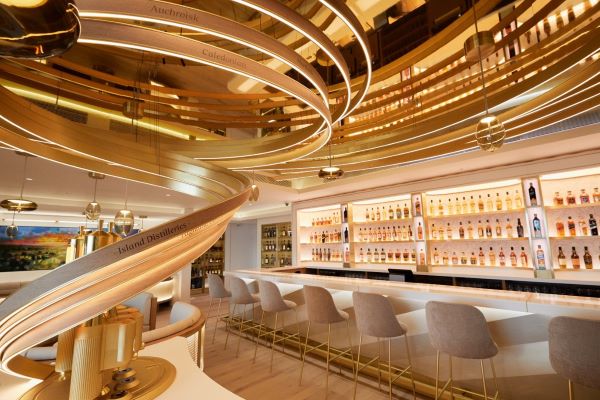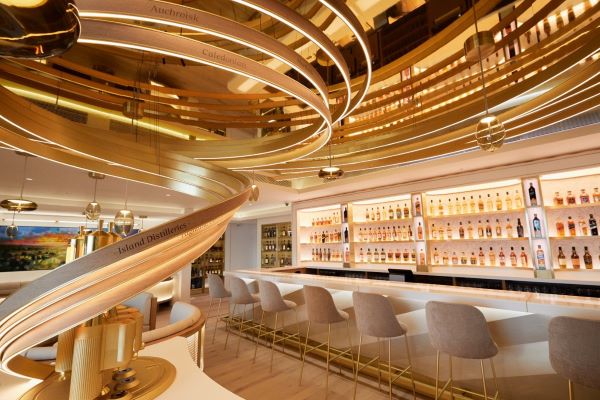LUXURY!
As the Scotch whisky industry luxuriates in the deluxe world of luxury brands, it's clear the 'L-word' has been dulled through repetition. Undaunted, Diageo has just launched a whole new division in this space. Tom Bruce-Gardyne questions the timing …
In that old Monty Python sketch, four Yorkshiremen compare their humble roots over a glass of Château de Chasselas. "We lived for three months in a paper bag in a septic tank … and when we got home our Dad would thrash us to sleep wi' his belt," declares Michael Palin. "Luxury!" cries Graham Chapman.
Of course, luxury has always been a matter of perception in life as in high-end whisky. "One man's 'luxury' is another man's 'ultra-luxury'," says Elliot Wilson, strategy director at the drinks' marketing agency, The Cabinet. "There are so many categories and so many price-points that contain the word luxury."
For its new Luxury Group launched last month, Diageo has taken a definition of - 'over US$100' a bottle in retail. The idea is to bundle together the company's high-end brands and brand homes, in a bid to become the number one luxury spirits company in the world. For Scotch, that includes malts like Brora and Port Ellen along with Edinburgh's Johnnie Walker Experience and Blue Label.

Not to be outdone, Diageo GB launched its own UK version called Diageo Luxury Company with a decidedly more modest definition of anything over £30 a bottle – not a lot to enter 'the exclusive world of luxury'. Indeed, in Scotland a litre of the cheapest blend would almost qualify thanks to the hike in minimum unit pricing.
"Luxury is not a new concept at Diageo, but it has evolved. Now, we see the luxury consumer is younger and more diverse," explains Julie Bramham who heads up the new enterprise having been global brand director at Johnnie Walker.
"It's something we've been thinking about for a while," she says. "It aligns with our confidence in the potential for luxury international spirits which is a US$12.7 billion category, growing twice as fast as international spirits overall, and we know growth in experience and experience-based goods is buoyant too."
The US$12.7bn figure comes from 2023 IWSR data and almost two years on, one suspects its growth has slowed significantly. Indeed, only last August Diageo's CEO, Debra Crew, acknowledged that for US$100+ spirits in the crucial US market "those bottles are definitely feeling the pinch." And no doubt even more so in China right now.
That is the trouble with data, it is never quite up-to-date. As Spiros Malandrakis, industry manager – alcoholic drinks at Euromonitor, told Whisky News in November 2023: "Everyone continues to talk about premiumisation not losing momentum, but they're talking about something 6-7 months ago."
Diageo announced its new group on November 12th, and the accompanying press release quoted Bain & Co's luxury report 2023 which projected the sector would hit a record US$1.5 trillion in global sales last year. Had Diageo waited a day, the 2024 report would have been available.
It makes for more sobering reading with the personal luxury goods market set "to see its first slowdown since the Great Recession," and fall 2% at current exchange rates. The trend is apparently "particularly acute" among Gen Z, while some "50 million consumers have either opted out of the luxury goods market or been forced out of it in the last two years," claimed Bain & Co's Claudia D'Arpizio.
The report's headline describes sales as "relatively flat as consumers prioritise experiences over products amid uncertainty." For Elliot Wilson, luxury Scotch leans towards the latter. "I am sure that the value doesn't lie in the bottle or the liquid but in the experience or opportunity the physical thing can unlock," he says.
This recalls the classic dilemma for the collector / high-end drinker of Scotch. The moment you pull the cork and pour a dram for your friends is when the whisky comes alive, but it's also the moment its financial value dies. Most luxury products are unable to offer that sense of shared enjoyment. You can't really share a designer handbag in the same way.
There is also the experience of going to the source that distillers like Diageo can lay on. "Our brand homes and distilleries offer curated intimate, exclusive events, access to rare casks, and direct connections with master distillers," says Julie Bramham. "These initiatives make luxury more tangible and accessible without diminishing its aspirational nature."
Yet in most people's eyes, Diageo is a classic FMCG business concerned with shifting container-loads of Johnnie Walker Red and Black around the world. Can this company that once owned Burger King really transition to the world of LVMH with its Dior, Dom Pérignon and Glenmorangie. Who knows – but perhaps it shouldn't even be trying.
'You cannot build a market with luxury whiskies. You certainly can't save it,' claimed the whisky writer Dave Broom in a recent post. 'The fancy bottles and one-offs of rare drams have a place, but they are not what the people who could save your business want to drink. They are a distraction.'

Award-winning drinks columnist and author Tom Bruce-Gardyne began his career in the wine trade, managing exports for a major Sicilian producer. Now freelance for 20 years, Tom has been a weekly columnist for The Herald and his books include The Scotch Whisky Book and most recently Scotch Whisky Treasures.
You can read more comment and analysis on the Scotch whisky industry by clicking on Whisky News.




